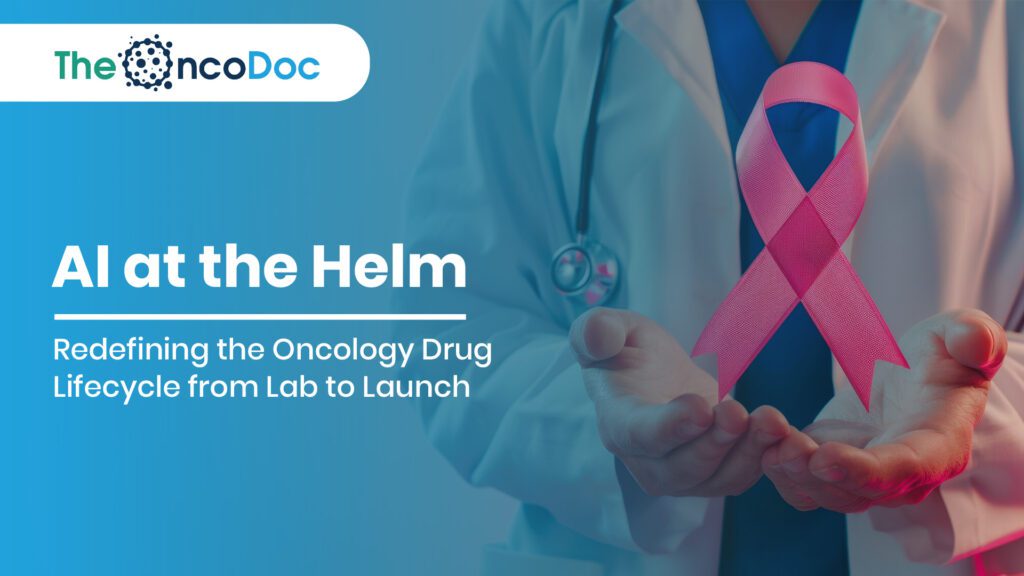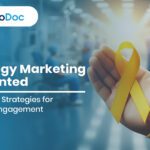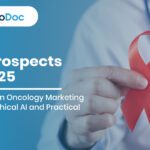Introduction: AI as the Cornerstone of Oncology Transformation
Oncology is entering a revolutionary era where artificial intelligence (AI) is no longer an optional innovation but the strategic backbone of every stage in the drug lifecycle. From early-stage discovery and clinical trial optimization to post-launch strategies and patient engagement, AI has become a critical enabler, driving both innovation and efficiency. This transformation is redefining pharmaceutical marketing, shifting it away from traditional promotional tactics and toward evidence-based partnerships built on transparency and trust.
Cancer care today is highly data-driven, personalized, and globally interconnected, requiring sophisticated tools to navigate vast datasets and evolving patient needs. Pharma companies now rely on AI to:
- Accelerate research timelines and significantly lower R&D costs.
- Develop precision therapies tailored to genetic, environmental, and lifestyle factors.
- Build trust-focused campaigns rooted in real-world evidence (RWE) rather than generic messaging.
The convergence of science, data, and marketing powered by AI is setting a new benchmark for oncology innovation. This article examines the market dynamics, investment trends, and AI-driven strategies shaping the future of oncology marketing, presenting actionable insights for pharma leaders seeking competitive differentiation while improving patient outcomes. The future of oncology is here, and AI is its foundation.
1. Market Dynamics and Investment Trends in AI-Driven Oncology
The global AI-in-oncology market is expanding rapidly, reflecting the industry’s commitment to integrate data-driven intelligence at every level:
- Diagnostics (38%): AI-powered imaging, pathology, and liquid biopsy analysis lead this segment, allowing faster and more accurate detection.
- Hardware (40%): Investment in computational infrastructure, next-generation sequencing (NGS) tools, and cloud-based systems drives this category.
- Hospitals (50%): Cancer care centers have adopted AI-driven clinical decision support, demonstrating integration into everyday oncology workflows.
Investor confidence is at an all-time high, with venture capital for oncology AI start-ups increasing by 35% in 2024. Key drivers include:
- The rising demand for precision medicine based on genomic profiling.
- The hefty R&D expenses of conventional oncology, which average $2.5 billion for each approved medication.
- Diversified pipelines, particularly immunotherapies, targeted therapies, and ADCs, requiring advanced predictive analytics.
2. AI-Powered Oncology R&D: Speed, Precision, and Predictability
AI has redefined oncology R&D by bringing data-driven intelligence into early-stage discovery and preclinical studies.
- Computer-Aided Drug Design (CADD): Enables molecular docking simulations and rapid compound screening, saving 50% in costs.
- Generative AI (GAI): Creates optimized drug candidates by predicting molecular efficacy and safety profiles.
- Predictive Toxicology: Uses machine learning to anticipate adverse effects, improving Phase 1 success rates.
📌 Impact Insight: AI-discovered oncology drugs in Phase 1 trials now show 80–90% success rates, compared to 40–65% for drugs developed traditionally.
3. Multi-Omics Integration for Personalized Oncology
Genomic, transcriptomic, proteomic, and metabolomic analysis must be combined due to the complexity of cancer. AI-driven platforms:
- Identify resistance mechanisms and tumor evolution pathways.
- Enable precision targeting for patient subgroups.
- Optimize drug combinations based on multi-omics correlations.
This integration ensures personalized therapy pathways that improve outcomes while reducing unnecessary exposure to ineffective treatments.
4. Preclinical Studies Optimized with AI
AI simulation models now replace or reduce animal testing, predicting pharmacokinetics (PK) and pharmacodynamics (PD) in virtual cohorts. This minimizes ethical concerns while providing data that’s more translatable to human studies.
5. Clinical Trials Revolution: AI as a Trial Architect
Clinical trials, traditionally time-consuming and costly, are being re-engineered with AI.
- Patient Recruitment: Algorithms scan EHRs, genomic databases, and health records, reducing recruitment time by 30% and improving trial diversity.
- Adaptive Trial Design: Real-time data enables adjustments in trial protocols, dosing, and biomarker selection.
- Predictive Site Selection: AI identifies high-performing trial centers, reducing operational delays.
6. AI-Backed Commercial Narratives: From Science to Storytelling
AI generates Real-World Evidence (RWE) that transforms pharma marketing from promotion to education:
- Campaigns highlight measurable outcomes like 30% fewer ER visits in AI-analyzed patient cohorts.
- Patients’ and oncologists’ trust is increased when data-driven promises take the place of generic promotional messaging.
- Marketing teams now function as knowledge partners, integrating R&D insights into educational content.
7. AI-Driven Market Segmentation and Personalization
AI-driven segmentation strategies ensure messaging relevance:
- Oncology specialists receive therapy-specific updates based on prescribing behavior.
· Reminders for screenings and local information about treatment facilities are sent to patients.
- Outreach initiatives in underprivileged communities are shaped by insights from social determinants of health (SDOH).
8. Dynamic Marketing Campaigns with Predictive Analytics
AI enables real-time campaign optimization by analyzing search patterns, engagement metrics, and regional trends.
- Micro-campaigns are launched by predictive models when search terms connected to cancer increase.
- GPs receive educational nudges based on local cancer prevalence trends.
9. Evidence-First Physician Engagement
Oncologists increasingly demand data transparency. AI-powered dashboards provide:
- Peer-reviewed summaries tailored to specialty and patient load.
- Predictive efficacy reports to guide prescription choices.
- Regulatory-aligned safety updates to build confidence in novel therapies.
10. Patient-Centered Education Platforms
AI supports personalized digital content for patients:
- Symptom checkers recommend early screenings.
- Multilingual campaigns target diverse populations.
- Gamification elements encourage engagement in screening and treatment adherence.
11. Bridging R&D and Marketing Through AI
AI closed-loop ecosystem between discovery and commercialization is produced by AI:
· Predictive Pharmacoeconomics: Models project therapy affordability and market access readiness.
- Regulatory Intelligence: AI forecasts filing timelines and approval hurdles.
- Lifecycle Marketing: Post-market data continuously informs campaign evolution.
12. Post-Launch AI Applications
AI ensures ongoing value delivery after product launch:
- Safety Monitoring: NLP tools scan clinical records and online chatter for adverse events.
- Therapy Optimization: Predictive algorithms flag early resistance signs.
- Patient Retention Programs: Wellness apps offer adherence reminders, nutrition support, and emotional care resources.
13. Partnerships for Scalable AI Impact
AI’s success depends on multi-stakeholder collaboration:
- Pharma-Tech Alliances: Partnerships with tech giants ensure computational scalability.
- NGO and Government Integration: AI guides community screening campaigns in high-burden areas.
- Academic Collaborations: Universities contribute high-quality datasets for improved AI training.
14. AR, VR, and Voice-Based Oncology Education
Advanced technologies support both medical training and patient empowerment:
- VR Simulations: Educate oncologists on rare cancer therapies.
- Voice-Enabled Tools: Overcome literacy barriers in rural campaigns.
- AR-Based CME Sessions: Make pharma-sponsored training interactive and practical.
15. Ethical and Regulatory Frameworks for AI
AI integration demands robust oversight:
- Data privacy remains a top concern, especially for genomic datasets.
- Bias mitigation is essential to ensure AI models perform across diverse populations.
- Regulatory agencies now mandate explainability in clinical AI, ensuring transparency in decision-making.
16. The Future of AI in Oncology Pharma Marketing
The oncology market will evolve into an AI-first ecosystem:
- Digital Twins: Virtual patient models simulate therapy outcomes for better personalization.
- Proactive Campaigns: AI identifies cancer risk signals before symptoms appear.
- Emotion-Centered Engagement: Sentiment analysis tailors campaigns for empathy-driven connections.
17. Measuring Success Through Impact Metrics
Oncology marketing is no longer measured by reach or impressions. AI allows campaigns to focus on:
- Screening Uptake Rates: A direct measure of early detection.
- Therapy Adherence: Ensures long-term survival benefits.
- Survivor Engagement: Advocacy and brand loyalty are fostered by post-treatment communities.
18. AI in Health Equity and Access
AI also bridges health inequity gaps:
- Algorithms identify underserved populations by analyzing regional cancer burden and resource allocation.
- AI-powered telemedicine platforms provide remote oncologist consultations in rural regions.
- Predictive analytics inform government-led cancer screening drives, maximizing resource deployment.
19. AI-Driven Pricing and Market Access Strategies
Pharma pricing models are now AI-powered simulations:
- Cost-effectiveness models predict payer responses, helping companies design value-based contracts.
- AI forecasts regulatory trends, ensuring faster reimbursement approvals.
- Health economic simulations help governments and insurance providers prioritize high-impact therapies.
20. Digital Twin Technology for Personalized Oncology
Digital twins replicate a patient’s entire biology:
- Predict responses to multiple therapies in silico.
- Simulate disease progression scenarios.
- Guide oncologists to personalized treatment plans, reducing trial-and-error prescribing.
21. AI for Competitive Intelligence in Pharma Marketing
AI is revolutionizing competitive intelligence, enabling pharma companies to stay ahead in a rapidly evolving oncology market.
- Automated sentiment analysis evaluates public perception of competitor brands, offering actionable insights for reputation management.
- Advanced social listening tools detect early discussions and buzz around emerging therapies, giving marketers a competitive edge.
- Predictive modeling forecasts competitor strategies and market shifts, helping pharma companies proactively refine messaging and campaign positioning.
By combining real-time monitoring with predictive analytics, AI empowers brands to make data-driven decisions, respond faster to competitor moves, and maintain leadership in a crowded oncology market landscape.
22. AI for Patient Advocacy and Community Building
AI is reshaping patient advocacy by creating stronger, more supportive oncology communities that extend well beyond treatment.
- Virtual oncology platforms powered by AI connect patients, caregivers, and survivors, offering emotional support, practical advice, and a safe space for shared experiences.
- Sentiment analysis technologies look for growing patterns of worry or dread in community interactions, forums, and comments. This allows advocacy groups and pharmaceutical companies to design wellness programs that are timely and specifically targeted.
- Survivor-led initiatives, acquire more depth, with the help of AI insights, guaranteeing that narratives connect with target audiences and foster genuine, grassroots trust.
This approach positions pharmaceutical companies as more than therapy providers; they become partners in holistic cancer care, offering emotional support alongside clinical solutions. By blending data-driven insights with human empathy, AI strengthens advocacy networks, improves patient confidence, and creates meaningful engagement that fosters loyalty while elevating patient voices in oncology marketing strategies.
23. Marketing Automation and Omnichannel Engagement
AI has transformed oncology marketing into a dynamic, self-optimizing ecosystem that delivers precision at scale.
- Continuous campaign monitoring ensures real-time performance evaluation, allowing immediate adjustments for maximum impact.
- AI-driven personalization dynamically adapts messaging based on patient behavior, preferences, and engagement patterns, making every touchpoint relevant and meaningful.
- Integrated marketing clouds seamlessly coordinate communication across digital, social, email, and offline channels, ensuring consistency and reinforcing brand trust.
This level of automation allows pharma companies to focus on strategy while AI handles execution. The result is hyper-targeted, responsive campaigns that drive deeper connections and improve outcomes.
24. The Role of AI in Global Oncology Collaboration
AI is becoming the backbone of international oncology collaboration, breaking data silos and creating a truly global approach to cancer care.
- Real-time data sharing between research centers worldwide accelerates multinational clinical trials, enabling faster patient recruitment and more representative trial populations.
- AI-driven compliance systems streamline regulatory workflows, ensuring adherence to diverse regional guidelines and reducing delays in approvals and trial execution.
- Global insights and analytics empower pharmaceutical companies to design synchronized marketing strategies, launch therapies across multiple geographies, and adapt messaging for cultural and linguistic diversity.
By bridging gaps between nations, AI transforms oncology into a connected ecosystem where discoveries, approvals, and campaigns no longer happen in isolation. This interconnected approach shortens time-to-market, increases access to advanced treatments, and strengthens collaboration between regulators, healthcare providers, and pharma companies. AI’s global reach ensures oncology innovations benefit patients worldwide with unprecedented speed and efficiency.
25. Emotion-Centered Oncology Marketing: A Human-AI Hybrid
Emotions remain at the heart of every cancer journey, and oncology marketing is evolving to reflect this reality. AI now plays a pivotal role in amplifying empathy while delivering precision-driven communication.
- Emotional analytics allow brands to understand patient sentiments, guiding campaigns to adopt the right tone, reassuring, hopeful, or educational, based on audience needs.
- Survivor-led storytelling is strategically integrated into campaigns to normalize conversations around cancer, reduce stigma, and inspire trust, making marketing content deeply relatable.
- AI-powered insights help marketers bridge the gap between complex clinical data and compassionate messaging, ensuring that content resonates emotionally without compromising scientific integrity.
This fusion of human emotion and AI-driven intelligence ensures that oncology campaigns are no longer purely promotional, they are supportive, personalized, and community-focused. By prioritizing empathy alongside data, brands can position themselves as trusted allies in the cancer care journey, strengthening engagement and long-term loyalty.
Conclusion: Oncology’s Future is AI-First
AI is rewriting the rules of oncology by merging science, empathy, and strategy into one seamless ecosystem. Pharmaceutical companies that embrace AI:
- Achieve faster, safer, and more affordable innovation.
- Deliver patient-first campaigns that resonate with emotional and clinical depth.
- Gain a strategic edge by connecting R&D, regulatory, and marketing insights into a unified growth strategy.
The oncology brands of the future will not just sell therapies, they will save lives more efficiently, ethically, and empathetically. In this AI-driven era, success is measured not by prescription numbers, but by the number of patients detected earlier, treated effectively, and empowered to thrive.
The Oncodoc team is a group of passionate healthcare and marketing professionals dedicated to delivering accurate, engaging, and impactful content. With expertise across medical research, digital strategy, and clinical communication, the team focuses on empowering healthcare professionals and patients alike. Through evidence-based insights and innovative storytelling, Hidoc aims to bridge the gap between medicine and digital engagement, promoting wellness and informed decision-making.



